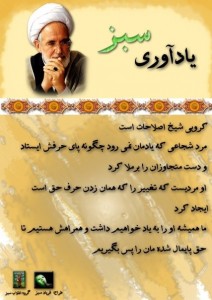Thursday
Sep172009
Iran: So, What Are the Green Movement's Goals Tomorrow?
 Thursday, September 17, 2009 at 15:11
Thursday, September 17, 2009 at 15:11
Qods Day: A Protest For Palestine or Against Iran’s Government?
Iran’s Chess Match: Setting Up the Pieces for Friday
The Latest from Iran (17 September): Tomorrow
Receive our latest updates by email or RSS SUBSCRIBE TO OUR FEED
Buy Us A Cup of Coffee? Help Enduring America Expand Its Coverage and Analysis
 Last night EA's Chris Emery sent me this challenging question:
Last night EA's Chris Emery sent me this challenging question:
"What do you think the Green Movement consider to be their achievable aims on Friday and, more generally, beyond that? What would be their ideal result?
"My view is that the Green Movement is unsure what is achievable now and aim simply to demonstrate that they have not gone away (an achievement in itself --- but not necessarily leverage). Sadly, I think the authorities probably have a clearer idea of their aims and consider most of them, but not all, achievable."
This was my immediate reply:
Chris' response:
Over the next 24 hours, we'll be debating this question, with other EA staff putting in their views and, of course, welcoming the thoughts of our readers.
Tomorrow is Qods Day.
Iran’s Chess Match: Setting Up the Pieces for Friday
The Latest from Iran (17 September): Tomorrow
Receive our latest updates by email or RSS SUBSCRIBE TO OUR FEED
Buy Us A Cup of Coffee? Help Enduring America Expand Its Coverage and Analysis
 Last night EA's Chris Emery sent me this challenging question:
Last night EA's Chris Emery sent me this challenging question:"What do you think the Green Movement consider to be their achievable aims on Friday and, more generally, beyond that? What would be their ideal result?
"My view is that the Green Movement is unsure what is achievable now and aim simply to demonstrate that they have not gone away (an achievement in itself --- but not necessarily leverage). Sadly, I think the authorities probably have a clearer idea of their aims and consider most of them, but not all, achievable."
This was my immediate reply:
The immediate aim? Stand up to Ahmadinejad.
I appreciate the wider points about aims but just surviving after everything thrown at the movement would be a victory. It maintains some space for all the complex negotiations going on in Tehran and Qom.
For me, if the President succeeds, this is no longer an Islamic Republic. Karroubi and senior clerics are saying this but they need the public display if they're to have any traction against the forces around Ahmadinejad.
Chris' response:
I agree both on the aim and the achievement of still making noise. It would be a victory but how will it limit the President's power? If Ahmadinejad's aim is to establish a military dictatorship and the Supreme Leader's is to preserve the authority of his office, then I think these demonstrations put much more pressure on the Supreme Leader than on Ahmadinejad. The President seems unconcerned by his lack of legitimacy and confident of the loyalty and capability of the security services. Ayatollah Khamenei has placed his lot with a man who literally is not bothered by the protests.
In regard to the complex negotiations in Tehran and Qom, you have to ask why they need more space and how they will use it. Are they hoping that the demos will somehow make a strategy for limiting Ahmadinejad's power clearer? Are they hoping that Ahmadinejad will have his wings clipped by the Supreme Leader? I think that rather than the people providing space for never-ending complex negotiations, which have now been rumbling on for more 3 months, those in the negotiations need to provide the space for the people by showing some real leadership. Open letters to the Supreme Leader backed by real threats, strikes, etc.
But they won't, and I expect that Ahmadinejad will get up on friday and say I won, I am your President, my mandate is to root out those contaminating the revolution or acting as foreign agents. You will not win. In other words, your demonstrations do not scare me.
I think that in the long term, the genie will never go back in the bottle and that is the Green movement's fantastuc legacy. However, in the short term, they need some direction if they are to persuade the Supreme Leader that the situation demands some immediate concessions.
Over the next 24 hours, we'll be debating this question, with other EA staff putting in their views and, of course, welcoming the thoughts of our readers.
Tomorrow is Qods Day.

 Meir Javedanfar offers this useful overview,
Meir Javedanfar offers this useful overview, 
 Maryam at Keeping the Change
Maryam at Keeping the Change  It was a quieter day on Tuesday, but make no mistake, there were some significant moves. And in those moves were the indications of both possibilities and problems for the opposition and for the Government.
It was a quieter day on Tuesday, but make no mistake, there were some significant moves. And in those moves were the indications of both possibilities and problems for the opposition and for the Government.